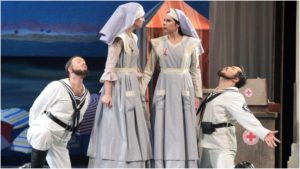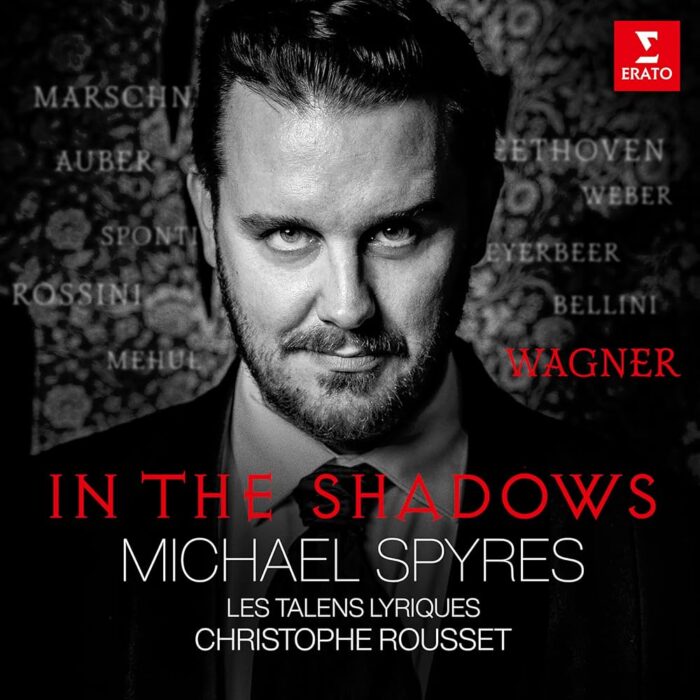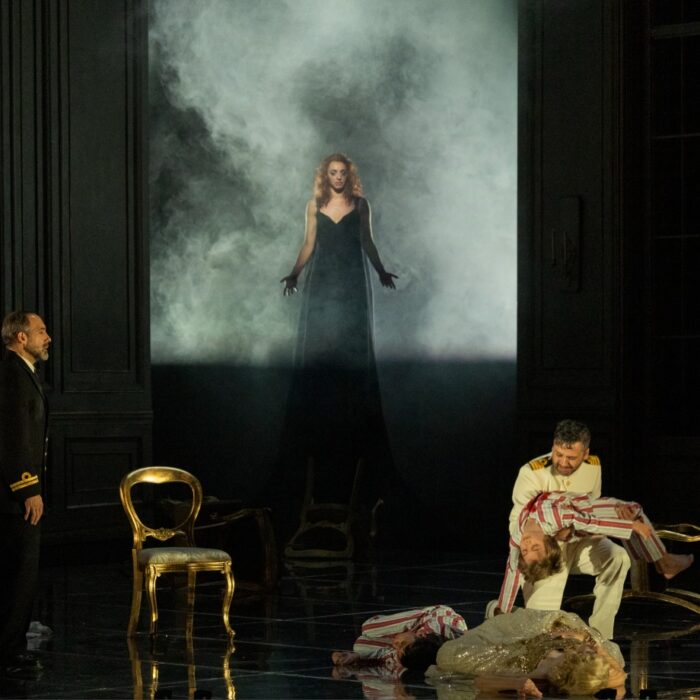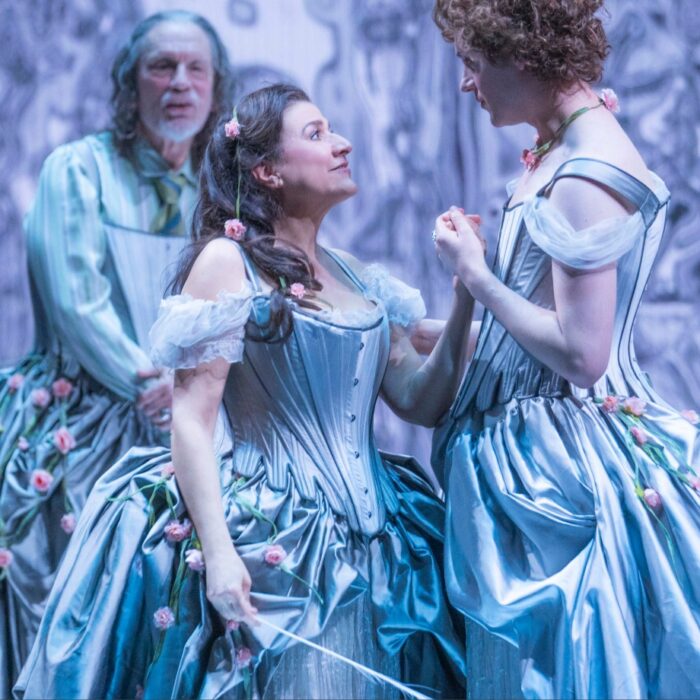
Lyric Opera of Chicago 2017-18 Review – Così Fan Tutte: Crebassa and Martinez shine in Mozart’s Infidelity Comedy
By Santosh VenkataramanThe basic premise of “Così fan tutte” is that the women are the butt of the joke as they are fooled by wily old Don Alfonso and the maid Despina into falling for men from distant Albania while believing that their lovers are away having gone to war.
Despite that plot point, it is fair to say “advantage women” for Lyric Opera of Chicago’s current run of Mozart’s comedy. That’s because it was the sublime singing of Marianne Crebassa as Dorabella and Ana María Martinez as Fiordiligi that stole the show for this performance, seen Monday night.
Meditteranean Setting
This production debuted back in 2005 jointly between the Opera de Monte Carlo and San Francisco Opera. The director at the time, John Cox, transforms the time period from the 18th century to 1914 along the Mediterranean with pastel-colored umbrellas hovering in the background.
World War I being on the horizon adds a macabre sense to the proceedings. Yet the sense of merriment and pure folly is on display right from the start as Alfonso makes his bold claim to the soldiers Ferrando and Guglielmo that women can’t be trusted.
False Start As Usual
One of the oddities of this opera is how famed librettist Lorenzo Da Ponte delves completely into the story in the opening with the soldiers and Alfonso in the middle of a conversation with no context as to how it began. It’s as if Da Ponte is in a rush to get to the gags he has penned.
The problem is it makes the start seem rushed, with the performers and conductor forced to adjust to each other. This first scene really does little except set up the stakes that Alfonso has bet the soldiers that their women will not be faithful to them.
Ladies Dominate Throughout
Perhaps that’s why scene two is so much more effective. That was certainly the case on this night when Martinez and Crebassa came out with a forceful “Ah guarda sorella” about their love for their men. It was sung beautifully, a theme that would hold up throughout the night.
Martinez is no stranger to the Lyric, having shined as Tatiana in “Eugene Onegin” last season and as Donna Elvira in the season-opening “Don Giovanni “of 2014-15. The soprano was the most familiar performer of this ensemble and lived up to that billing with an audacious “Come scoglio” declaring that she is as strong as a rock. Martinez was a potent force dramatically and vocally as the woman with the higher morals.
Dorabella, on the other hand, is more weak-willed between the women. The mezzo-soprano Crebassa embodied this spirit with more coquettish and girlish mannerisms. When she succumbs to the charms of Joshua Hopkins’ Guglielmo in their duet “Il core vi dono,” it is completely believable that her Dorabella would stray from the love of her life.
The ‘Third Couple’
The characters of Don Alfonso and Despina are far from secondary and the odd couple of old and young with twin cynical hearts were responsible for laughs aplenty.
The veteran baritone Alessandro Corbelli was always in command as Alfonso, portraying a character so sure of himself that he could win his wager. His deadpan delivery and stage presence kept the soldiers on their toes.
Making her American debut as the frustrated maid Despina was Russian soprano Elena Tsallagova and she was a one-woman riot at times. Her tete-a-tete in which she agrees to serve as an accomplice to Alfonso quickly made the audience enjoy seeing this duo in cahoots.
Tsallagova delightfully hammed it up in her various disguises, most notably as the doctor called in to cure the Albanians after they had consumed “arsenic.” Her Despina rolled in a yellow machine that administered a shock to both gentlemen’s privates.
Men Having Fun
While the women were outstanding, the men who played Ferrando and Guglielmo showcased plenty of charm, wit, and physical comedy as willing pawns in Alfonso’s scheme.
The baritone, Hopkins, brought a masculine presence to Guglielmo, who is certain that his Dorabella will remain true to him. His frustration is evident when he launches into his “Donne mie, la fate a tanti” about the fickleness he has witnessed once Fiordiligi falls for him.
Portraying Ferrando was rising tenor Andrew Stenson, who notably appeared in Lyric’s premiere of “Bel Canto” and will be seen as Private Danny Chen in the much-anticipated “An American Soldier” at Opera Theatre of St. Louis this summer. He grew into his emotive “Un’aura amorosa” which he began lying down before rising up as he gained strength in his conviction that the women will remain faithful.
Both men worked in nice touches in terms of their acting. Hopkins’ gloating that his woman was faithful was hilariously arrogant; how Stenson constantly slapped himself in the face as a side effect to Despina’s shock was a terrific sight gag.
Dark?
This production saw the women agree to marry the Albanians all too eagerly, with Hopkins’ Guglielmo muttering under his breath that he wished that the ladies would really drink arsenic. It all added up to a tense finish amidst all the frivolity.
This performance of “Cosi fan tutte” ends in ambiguity. The women are not happy that they are deceived and the men are not happy that they were betrayed. Alfonso may be happy to have won his bet, but he has created something irrevocable in the process.
It’s hard to know what to take away but is a conclusion really necessary when listening to such wonderful music? Conductor James Gaffigan was a success in his Lyric debut in bringing out Mozart’s genius. In a season full of serious drama, it was a welcome change to see a light-hearted work at the Lyric.


